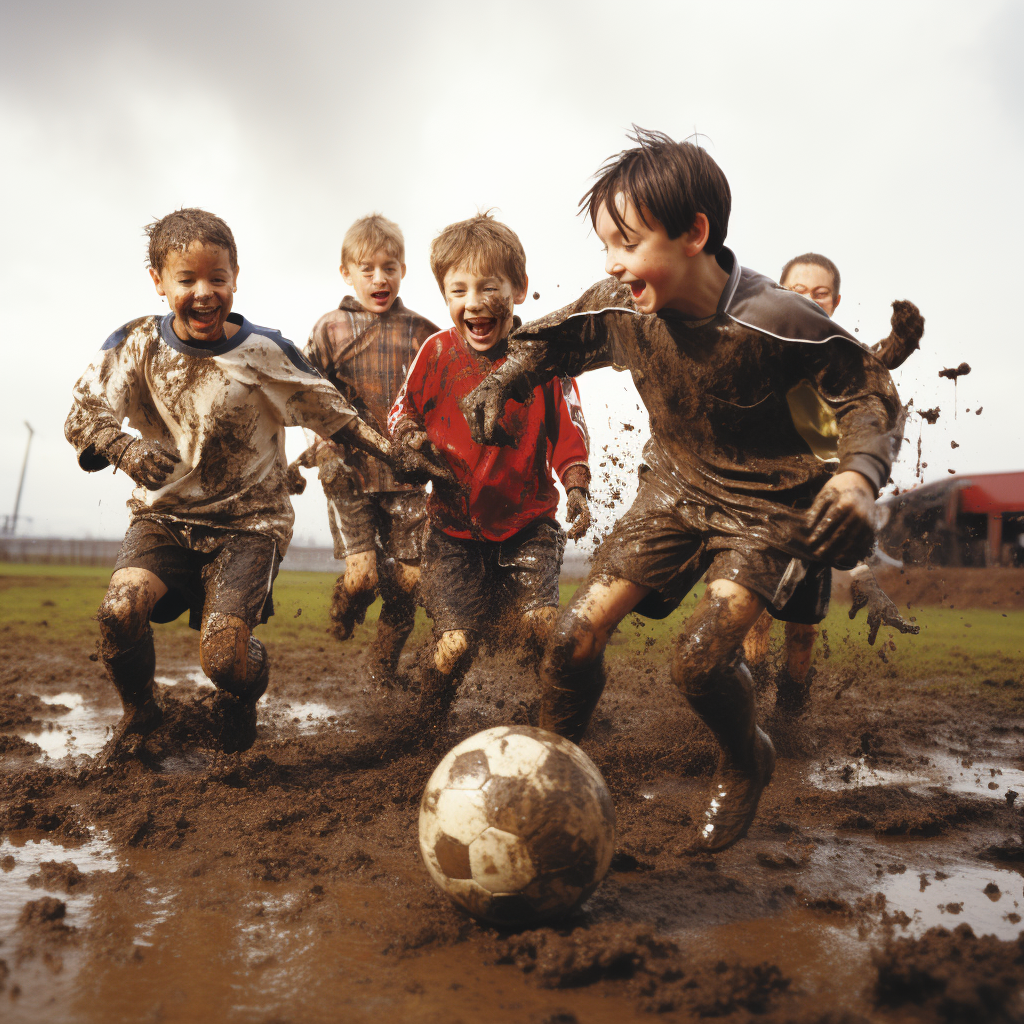Soccer Advice for Supporting Young Soccer Players
Soccer is a fantastic sport for children, and as a parent, involvement in your child’s soccer journey can be both exciting and beneficial.
Navigating the world of youth soccer can be challenging, but understanding the basics is crucial to supporting your child and ensuring a positive, fulfilling experience.
By knowing the skills needed, instilling a love for the game, and staying educated on coaching styles, equipment, and safety, parents can help their children develop both physically and mentally in this fun and engaging team sport.
However…
It’s not enough to merely know about soccer; parents must play an active role in their child’s soccer journey to ensure success.
This includes being present at practices and games, fostering teamwork and social skills and helping their child learn from their mistakes and setbacks.
By staying involved in their child’s soccer development, parents not only empower their children to reach their full potential on the field but also teach valuable life lessons and demonstrate the importance of education beyond the field.
Key Takeaways
- Equip yourself with basic knowledge about youth soccer to support and guide your child throughout their journey.
- Assist your child in developing soccer skills, physical and mental strength, and teamwork values for on and off the field success.
- Stay actively involved in coaching, safety, and parent resources to ensure a well-rounded soccer experience for your child.
Getting Started in Youth Soccer
Understanding the Basics
Youth soccer is a great way for your child to stay active, develop teamwork skills, and build confidence.
It is essential for parents to understand the basic rules and concepts of soccer before their child gets started. Encourage your child to practice and develop their skills, while also promoting sportsmanship and teamwork.
- Structure and rules: Soccer is played with two teams, each consisting of 11 players. The objective is to score goals by moving the ball into the opponent’s net using only your feet, head, and body. There are basic rules that need to be followed, such as offsides, throw-ins, and penalty kicks.
- Age-appropriate development: According to Soccer Today, it’s important to recognize that soccer starts at a young age and that instilling a love for the sport is crucial.
- Equipment and safety: Ensure your young athlete has the appropriate gear such as soccer cleats, shin guards, and a properly fitting uniform.
Choosing the Right Club
Selecting the right soccer club for your young athlete is essential for their development and enjoyment of the sport.
Here are some factors to consider when choosing a youth soccer club:
- Coaching staff: The quality of the coaching is an essential factor. Look for experienced and well-trained coaches who focus on player development and sportsmanship.
- Club philosophy: Research the club’s mission and values to ensure that they align with your expectations. Some clubs focus on winning at all costs, while others prioritize player development and enjoyment.
- Level of competition: Assess your child’s individual skills and soccer goals to determine what level of competition is most suitable. Clubs offer various options such as recreational leagues, competitive travel teams, and elite academy programs.
- Location and logistics: Proximity to your home, practice schedules, and game locations might impact your decision. Balancing convenience with the best soccer experience for your child is crucial.
Taking the time to understand the basics and research potential soccer clubs will help create a positive experience for your child, fostering their growth as a soccer player and a confident athlete.
Supporting Your Child’s Soccer Journey
The Role of the Soccer Parent
As a soccer parent, your role goes beyond driving your child to practices and games.
Your attitude, support, and encouragement can heavily influence your child’s experience.
Maintain open communication with both your child and their coach, and be aware of the coach’s philosophy, goals, and expectations for the team.
It’s important to let the coaches coach.
Trust their expertise and give them space to share their knowledge, instruct players, and build a team.
Remember, your primary focus should be on supporting your child, not dictating their performance or coaching from the sidelines.
Creating a Positive Environment
- On the sidelines: Be a positive role model by exhibiting good sportsmanship, clapping for both teams, and refraining from yelling instructions or criticism during games. Your positive sideline attitude can contribute to a constructive environment for your child and the entire team.
- Encouragement: Offer praise and recognition for effort, improvement, teamwork, and sportsmanship. Remember that growth comes from learning, and not every game or practice will be perfect. Celebrate achievements but also use setbacks as opportunities for growth.
- Car ride home: Use the car ride home as a safe space for your child to reflect on and discuss their performance. Avoid dissecting the game or focusing on mistakes. Instead, be a keen listener and focus on the positives or aspects they enjoyed.
By fostering a supportive and positive environment, you can greatly contribute to your child’s soccer journey and help them reach their full potential. Ensure you create space for open dialogue, exhibit a positive attitude, and offer consistent support to make the most of this experience.
Soccer Skills and Practice
Essential Skills for Players
Every soccer player should focus on developing key skills.
These skills include ball control, passing, shooting, and dribbling.
Good ball control is crucial for players to be able to receive, maintain, and manipulate the ball effectively during games.
Passing allows players to move the ball between teammates and create scoring opportunities. Shooting is necessary for scoring goals, while dribbling enables players to keep possession and navigate through defenders.
Additionally, players need to develop a strong sense of positioning and spatial awareness, making them more effective on the field.
This can be fostered through regular practice and game experience.
Maximizing Practice Time
To get the most out of their practice time, soccer players should:
- Focus on individual skill-building exercises.
- Participate in small-sided games to improve their decision-making and teamwork.
- Set specific goals for improvement and track their progress.
- Don’t neglect the importance of physical fitness; incorporate aerobic and strength training exercises into their routine.
Home Practice Tips
Parents can support their children’s soccer development by encouraging home practice. Here are a few tips for productive home practice:
- Create a designated practice area in the yard or nearby park, complete with basic equipment like a soccer ball, cones, and a goal if possible.
- Emphasize repetition in skill-building exercises, such as juggling the ball, passing against a wall, and shooting at a target.
- Encourage proficiency with both feet; this will make your child a more versatile and valuable player on the field.
- Promote a growth mindset and remind your child that consistent practice and effort will lead to improvement.
By cultivating essential skills and making the most of practice time, young soccer players can develop their abilities significantly and become more confident on the field.
With the support of engaged parents, these athletes can maximize their potential and enjoy a successful soccer journey.
Developing Physical and Mental Strength
Physical Fitness in Soccer
In soccer, physical fitness is crucial for players to excel on the field.
It is important for parents to encourage their children to consistently work on their physical strength, endurance and flexibility.
Hard work and determination are essential to develop and maintain a high level of physical fitness in soccer.
Incorporate activities such as running, sprinting drills, and strength training into their regular workout routine.
A sample training regimen for youth soccer players could include:
- Warm-up: Light jogging and dynamic stretches
- Sprinting drills: Short to medium distance sprints with recovery time in between
- Endurance training: Longer runs at a moderate pace.
- Strength exercises: Bodyweight exercises like push-ups, squats, and lunges or resistance training using weights.
- Cool down: Static stretches to increase flexibility.
Mental Conditioning
Being mentally tough is just as crucial for soccer players as physical fitness.
Parents should consider introducing brain training exercises to help children develop their mental resilience.
Incorporating activities like mindfulness exercises, visualization techniques, and stress management can help young players hone their mental strength.
For mental conditioning, parents can engage their children in the following exercises:
- Mindfulness exercises: Deep breathing, meditation, or yoga to develop focus and calmness.
- Visualization: Encourage players to imagine themselves performing a skill or scoring a goal. This can help them improve their confidence in their abilities.
- Goal setting: Set realistic and achievable short-term and long-term goals to keep motivation levels high.
- Stress management: Teach players how to manage stress effectively, especially when they face setbacks or failure.
In addition to these exercises, parents could also consider hiring an Academy coach to work specifically on their child’s mental resilience.
An Academy coach can provide guidance and support in developing strategies to improve mental conditioning and resilience for your child.
By focusing on both physical fitness and mental conditioning, your child can develop the essential skills required to excel in soccer.
With consistent hard work and determination, their overall performance will improve, and they will be better equipped to handle the challenges of the game.
Navigating the Role of the Soccer Coach
Coach-Parent Communication
Establishing clear and open communication between the soccer coach and parents is essential for creating a positive experience for young athletes.
This includes understanding the coach’s philosophy, goals, and expectations for the team.
Parents should maintain an open dialogue with their child’s coach, asking questions and voicing concerns when necessary.
Confidentiality and respect are vital when expressing concerns or providing feedback.
Regular coach-parent communication methods can include:
- Email updates: Coaches send out a regular update to keep parents informed of important team news and announcements.
- Parent meetings: Coaches may schedule periodic meetings to inform and discuss team issues or updates with parents.
- Individual conferences: If concerns or questions arise, parents should set up a time to speak privately with the coach to address these topics.
Understanding the Coach’s Philosophy
A coach’s philosophy sets the foundation for how they approach coaching, including the values and principles they prioritize.
It’s crucial for parents to be aware of and support the coach’s philosophy to ensure a cohesive and constructive team environment.
Aspects of a soccer coach’s philosophy might include:
- Player development: Ensuring players develop technical skills, tactical knowledge, and physical fitness through practices and games.
- Teamwork: Emphasizing cooperation and collaboration among team members, with a focus on team dynamics and synergy.
- Sportsmanship: Encouraging fair play and respect for opponents, officials, and coaches at all times.
- Personal growth: Supporting each player’s personal growth by fostering self-discipline, mental focus, and confidence.
It is essential for parents to respect the soccer coach’s decisions and avoid undermining their authority, even if they disagree with specific choices.
A parent’s role should be to provide a supportive environment for their child, helping them understand and grow within the context of the coach’s philosophy.
By fostering strong communication and understanding the coach’s philosophy, parents and coaches can work together to create a positive and enriching soccer experience for young athletes, emphasizing coach integrity and the development of essential life skills.
Soccer Equipment and Safety
Essential Gear for Young Athletes
To keep your young athletes safe and comfortable on the soccer field, it is essential to provide them with the right equipment. The most important items include:
- Soccer cleats: These special shoes provide traction on the field and help prevent slipping. They also offer protection and support for your child’s feet.
- Shin guards: Protecting the lower leg from injury, shin guards are a must-have for all soccer players, regardless of age or skill level. They’re available in various sizes and materials, so choose one that fits your child comfortably and securely.
- Uniform: A properly fitting uniform encourages a sense of team unity and helps your child feel like part of the group.
Regarding your child’s active health and discipline, it’s important to instill good habits early on.
Encourage them to stay hydrated, eat a balanced diet, and get enough rest to prevent injuries and improve overall well-being.
Injury Prevention
Injury prevention should be a top priority for parents and coaches alike. To minimize the risk of soccer-related injuries, consider the following:
- Approach: Teach your child proper techniques, such as how to tackle, pass, and kick the ball. Also, emphasize the importance of sportsmanship and fair play.
- Warm-up and cool-down: Encourage your child to perform dynamic stretches before playing and static stretches after finishing a game or practice session. This helps improve flexibility, decrease muscle tightness, and reduce the risk of injuries.
- Recognizing and addressing injuries: If your child experiences any pain or discomfort during or after playing, immediately assess the situation and seek appropriate medical attention if necessary. Early intervention can prevent further complications and promote a faster recovery.
Soccer can be a fun and rewarding sport for children, but ensuring their safety is crucial.
By providing the right equipment and paying attention to their health, you can contribute to a positive experience and minimize the risk of injuries.
The Importance of Teamwork and Social Skills
Building Team Chemistry
Teamwork is a crucial skill for soccer players, as success on the field relies on the coordinated efforts of teammates.
Encouraging children to embrace teamwork and sportsmanship can boost their confidence and enhance their overall soccer experience.
This can be achieved through various activities, such as:
- Small-sided games: Divide players into smaller teams, which enables more involvement and collaboration.
- Passing exercises: Practice passing and receiving with different teammates to promote effective communication.
- Team discussions: Encourage players to share their opinions and ideas on how to improve as a collective group.
As players develop their teamwork skills, they will naturally learn to trust their teammates and work together towards a common goal, which can ultimately lead to a more cohesive and successful team.
Social Benefits of Soccer
Participating in soccer offers children the opportunity to develop meaningful friendships and connect with their community.
Through regular interaction with teammates during practices and games, soccer players have the chance to forge strong bonds and create a network of friends who share their passion for the sport.
This camaraderie can help boost a child’s confidence and provide them with a supportive environment to grow and thrive.
In addition to forming friendships, involvement in soccer exposes children to a diverse range of backgrounds and perspectives.
This exposure can help foster a sense of empathy and understanding amongst players, as well as teach them valuable life skills such as respect, tolerance, and cooperation.
Furthermore, soccer also plays a vital role in connecting children and families to their local communities.
As families attend games and support their local teams, they often forge bonds with other families, creating a sense of belonging and unity.
By promoting teamwork, developing social connections, and strengthening communities, soccer can have a profound impact on the lives of young players, instilling values and skills that will serve them well both on and off the field.
Learning from Mistakes and Setbacks
Handling Defeat
As a parent, helping your child to learn from their mistakes is crucial for their progress and development in soccer.
Whether on or off the field, it’s important to maintain a confident and knowledgeable attitude in order to provide the support they need.
Acknowledging that mistakes are a natural part of the learning process can help boost your child’s confidence and prevent them from getting discouraged.
When dealing with defeat, it is vital for parents to exhibit a neutral and clear demeanor in order to teach children about handling setbacks with grace.
Avoid dwelling on the negatives, and instead, focus on the lessons that can be learned. Remember, soccer is a team sport and each player’s attitude contributes to the overall atmosphere.
Here are some helpful tips for parents to support their children through mistakes and setbacks in soccer:
- Stay positive: Encourage your child to see setbacks as opportunities for growth and emphasize the importance of a positive attitude.
- Offer constructive feedback: Provide specific suggestions for improvement, while also praising their efforts and strengths. Make sure to do so in a neutral and constructive manner.
- Model composure: Display your own calm and composed demeanor during moments of defeat, so your child can learn how to cope with adversity by observing your behavior.
- Promote a growth mindset: Encourage them to believe that with hard work and persistence, they can improve their skills and overcome obstacles.
By helping your child to develop a resilient and focused approach to soccer, they are likely to enjoy a more fulfilling and successful experience.
Additionally, they will acquire essential life skills such as teamwork, hard work, and sportsmanship, which can be applied beyond the soccer field.
Education Beyond the Field
Life Lessons Through Soccer
Soccer can be an excellent platform for teaching valuable life lessons to children.
Through participation in the sport, kids learn the importance of teamwork, discipline, and effective communication.
It is crucial for parents to emphasize these lessons and reinforce their importance outside of soccer.
One way parents can help their child develop essential life skills is by encouraging them to set personal and team goals.
Goal-setting allows children to focus on specific objectives, whether it be improving their skills or learning a new position.
Discussing these goals regularly will enable parents to monitor their child’s progress and provide necessary guidance.
Academic Performance and Sports
A well-balanced education is crucial for the growth and development of children.
Studies have shown a positive correlation between regular physical activity and better academic performance. Playing soccer can help children strengthen their cognitive skills and ultimately empower them to excel in their studies.
- Time Management: Balancing soccer practice and schoolwork require effective time management. Parents should help their child develop a realistic schedule to ensure they allocate adequate time for both activities.
- Discipline: Soccer demands a high level of commitment and dedication. This discipline often translates into improved focus and concentration in academics, allowing children to reach their full potential in both areas.
- Academic Support: Parents can further support their child’s academic performance by maintaining open lines of communication with teachers and helping them establish realistic academic goals. Providing the necessary resources, such as guidance and tutoring, can also aid in their pursuit of success.
In conclusion, soccer can serve as a gateway for children to develop essential life skills and facilitate academic success.
Parents play a crucial role in guiding and supporting their child’s growth in various aspects of life, including on and off the soccer field.
Enhancing Soccer IQ
As a parent, helping your child develop a strong soccer IQ is crucial for their progress in the sport.
Soccer IQ refers to a player’s understanding of the game, decision-making abilities, and overall soccer knowledge.
Ensuring that your child has a solid grasp of soccer fundamentals and advanced tactics can significantly contribute to their success on the field.
In this section, we’ll discuss the importance of understanding the rules of the game and advanced tactics, as well as some strategies for fostering soccer knowledge and mental toughness in young players.
Rules of the Game
One vital aspect of developing soccer IQ is having a firm understanding of the rules of the game.
As a soccer parent, it’s essential to take the time to teach your child the basic rules, regulations, and terminology associated with soccer.
This will not only help them become a better player but also enable them to make informed decisions during matches.
Some key rules to cover include:
- The offside rule
- Types of fouls and penalties
- The dimensions of the field
- Player positions and their responsibilities
- The different ways to restart play (throw-ins, corner kicks, etc.)
By having a solid grasp of the rules, your child will be able to avoid common mistakes, effectively communicate with their teammates, and better understand their coach’s instructions.
Advanced Tactics
Another crucial aspect of developing soccer IQ is being familiar with advanced tactics.
As players progress, understanding more complex strategies and being able to anticipate opponents’ moves becomes increasingly important.
A few areas of focus for advanced tactics include:
- Formations and their pros and cons
- Tactical approaches for offense and defense
- Set-piece strategies, such as corner kicks and free kicks
- Recognizing and exploiting the opponents’ weaknesses
You can help your child expand their tactical understanding by watching professional matches together, discussing different strategies, and encouraging them to join an academy to further enhance their soccer knowledge and mindset.
By prioritizing the development of soccer IQ, you’ll empower your child to make calculated decisions on the field, adapt their approach according to the dynamics of the game, and ultimately elevate their performance.
Encourage your child to remain curious about the sport, learn from coaches and experienced players, and consistently work on honing their soccer knowledge.
Parent Resources and Community Involvement
Soccer Parent Resource Center
The Soccer Parent Resource Center is an invaluable platform for parents seeking guidance and support in their children’s soccer journey.
This platform offers empowering content that can help parents better understand player development and improve the overall youth soccer experience.
The center provides a variety of resources, such as interviews and webinars with experts in the field, as well as articles and discussions on various topics related to both the game and parenting in general.
By joining the Soccer Parent Resource Center, parents can gain access to a supportive community of like-minded individuals who believe in collaborating with coaches, clubs, and players to foster a positive environment for children’s soccer development.
This collaborative approach can lead to more inspired and thriving soccer players, which ultimately contributes to the growth of youth soccer participation.
Local Soccer Events
Getting involved in local soccer events is another way parents can play an active role in their child’s soccer experience.
Attending games, volunteering for club events, or participating in tournaments not only allows parents to demonstrate their commitment to their children’s soccer journey, but it also fosters a deeper personal connection with the game.
Here is a list of ways to participate in local soccer events:
- Attend games: Regularly watch your child’s matches and cheer them on from the sidelines.
- Volunteer: Offer your time and skills to help with various tasks like organizing fundraisers, assisting with club administration, or coaching.
- Organize social events: Plan team parties, picnics, or other gatherings to help build team spirit and camaraderie.
These types of community involvement enrich the soccer experience for both parents and children, ultimately aiding in player development and growth.
By engaging in these local soccer events, parents can feel more confident and knowledgeable in their role within the soccer community while remaining neutral and maintaining a clear focus on the wellbeing and advancement of their children.
Frequently Asked Questions
How can parents support their child’s soccer development?
Parents can support their child’s soccer development by encouraging them to practice regularly, providing them with opportunities to play and learn with skilled coaches, and offering constructive feedback. Seeking advice from experienced coaches and parents can also help to guide young soccer players effectively.
What are the signs that indicate a child has soccer talent?
Signs of soccer talent in a child include natural athleticism, strong ball control, and an ability to anticipate opponents’ moves. A talented player may also demonstrate quick decision-making skills, good stamina, and a competitive drive.
What role should parents play at soccer practices and games?
At soccer practices and games, parents should respect the coach’s role and avoid interfering in coaching decisions. They should also provide emotional support to their child, fostering a positive and constructive atmosphere. Additionally, parents should teach their child about teamwork and encourage them to communicate with teammates effectively.
How can parents encourage good sportsmanship in young soccer players?
Parents can encourage good sportsmanship by modeling respect for teammates, opponents, coaches, and referees. Emphasizing the importance of fair play and celebrating effort, rather than focusing solely on winning, can help to instill a sense of sportsmanship in young players.
What strategies can help improve a 13-year-old’s soccer skills?
To improve soccer skills in a 13-year-old, parents can explore various training exercises targeting individual techniques, such as dribbling, shooting, and passing. Additionally, encouraging them to watch and analyze professional soccer matches can provide valuable insights into advanced tactics and techniques.
How should parents handle negative behaviors on the soccer field?
When encountering negative behaviors on the soccer field, parents should address the issue calmly and constructively. They can discuss the behavior with their child, emphasising the importance of respect, teamwork, and good sportsmanship. In some cases, involving the coach in the conversation may be necessary to resolve more serious issues.











Leave a Reply